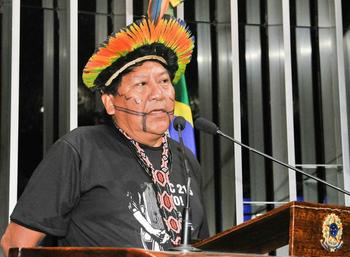
BRASILIA, Brazil, May 11, 2015 (ENS) – Federal Police officers from the states of Roraima, Rondônia, São Paulo, Amazonas, and Pará were marshaled Thursday to serve 313 warrants against people suspected of clandestine gold and gemstone mining on indigenous lands.
The law enforcement operation is chiefly aimed at illegal mining in the Yanomami indigenous reserve in Roraima, reports the state-run Agencia Brasil.
About 150 Federal Police are involved in serving the warrants, assisted by officers of the Brazilian Institute for the Environment and Renewable Natural Resources, IBAMA.

The crackdown comes less than one month after the Yanomami leader Davi Kopenawa and other indigenous leaders attended a special session of the Brazilian Senate held to honor indigenous peoples.
The crackdown operation is called Warari Koxi, in a reference to a Yanomami expression used for criticizing the destruction or harmful interference with a healthy environment. The Yanomami are the largest relatively isolated tribe in South America. They inhabit the rainforests and mountains of northern Brazil and southern Venezuela.
The illegal scheme on Yanomami land targeted by this investigation involved business leaders, public servants, goldminers, jewelers, and aircraft pilots.
Together they opened mining sites for gold, gemstones, and other minerals within indigenous reserves, particularly in northern Roraima.
Suspects will be charged with illegal extraction of natural resources, criminal conspiracy, misappropriation of national resources, receipt of stolen property, bribery, breach of public service confidentiality, smuggling and money laundering, among other charges.
Indigenous lands belong to the Brazilian State, and water and mineral resources in these areas can only be exploited with official permission.
Investigators estimate that the group obtained a monthly average 160 kilograms of gold through illegal mining.
Besides the environmental damage, the illegal activity may have cost the Brazilian Treasury as much as $5.6 million. Police also suspect that some of the gold was used for money laundering.
The investigators were stunned by the rapid destruction of the mined areas.
“How devastating the mining activity has been to the ecosystem, polluting rivers with mercury and other heavy metals, destroying the wildlife and the Yanomami culture,” said IBAMA.
Dário Vitório Kopenawa, the public policy coordinator for the Hutukara Yanomami Association, said, “There are many problems in all indigenous areas. There’s malaria, diarrhea, and other diseases. In the Yanomami reserve, one such problem is mining on site, which opens the door to intruders and goldminers who pollute our rivers with mercury.”
Copyright Environment News Service (ENS) 2015. All rights reserved.
© 2015, Environment News Service. All rights reserved. Content may be quoted only with proper attribution and a direct link to the original article. Full reproduction is prohibited.
